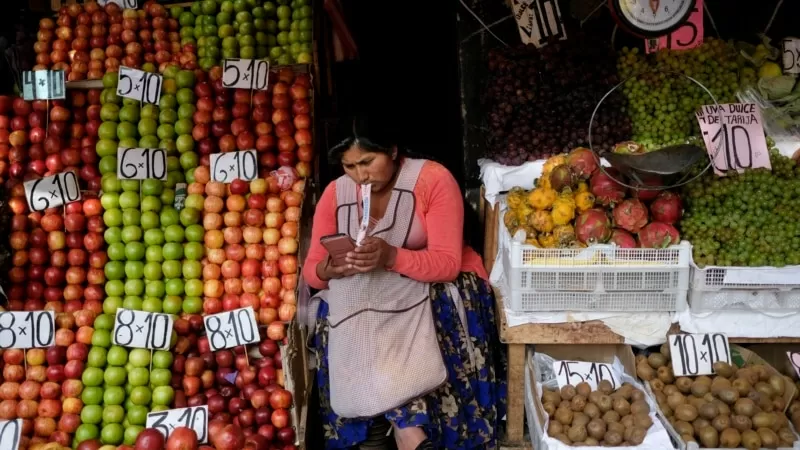LA PAZ — Signs reading “I’m buying dollars” line the doors of Víctor Vargas’ shoe shop in the heart of Bolivia’s biggest city, a desperate attempt to keep his family business alive.
Just a few years ago, the 45-year-old Vargas would unlock the doors at 8 a.m. to a crush of customers already waiting to buy tennis shoes imported from China. Now, his shop sits hopelessly empty.
“Right now, we’re facing a difficult crisis,” he said. “No one is buying anything anymore… We don’t know what the future holds.”
Bolivians like Vargas have been hit hard by economic turmoil in the small South American nation, fueled by a longstanding hyper-dependence on, and now a shortage of, U.S. dollars.
The economic downturn has been made worse by an ongoing feud between President Luis Arce and his ally-turned-rival former President Evo Morales, in the lead-up to next year’s presidential election. Many Bolivians impacted by the crisis have lost trust in Arce, who denies the country is facing an economic crisis.
“Bolivia’s economy is growing. An economy in crisis doesn’t grow,” Arce told The Associated Press in an interview. However, this statement has been contradicted by both economists and dozens of Bolivians.
This deep distrust came to a head on Wednesday, with a spectacle that the government called a “failed coup d’etat” and opponents, including Morales, called a staged “self-coup” meant to earn the unpopular leader political points before elections.
Regardless of whether the coup attempt was real or not, most Bolivians who spoke to the AP said they no longer believe what their leader says. They believe that Arce would be better served addressing Bolivia’s gasping economy, rather than carrying out political stunts.
“He should focus on Bolivia’s economy, make a plan for moving forward, and find a solution to the dollar shortage,” Vargas said. “No more of these childish ‘self-coups’.”
This simmering anger has paved the way for even more strife in a country that is no stranger to political unrest.
Bolivia’s economic crisis stems from a complex combination of dependence on the dollar, draining international reserves, mounting debt, and failures to produce products like gas, which was once the Andean nation’s economic boon.
This has resulted in Bolivia becoming an import-based economy that is “totally dependent on dollars,” according to Gonzalo Chávez, an economist with Bolivia’s Catholic University. While this once worked in Bolivia’s favor, driving the country’s “economic miracle” and making it one of the region’s fastest-growing economies, it has now backfired.
Vargas’ family opened their shoe business nearly 30 years ago, as they saw it as a reliable way to ensure stability for future generations. The family imports shoes from China, which they pay for in dollars and sell in Bolivia’s currency, bolivianos. Without dollars, they have no business.
The shortage of dollars has led to the emergence of a black market, with many sellers bringing in greenbacks from neighboring Peru and Chile and selling them at inflated prices.
Pascuala Quispe, 46, spent her Saturday walking around La Paz’s downtown area, going to different currency exchange shops in a desperate search for dollars to buy car parts. While the official exchange rate is 6.97 bolivianos to the dollar, she was told the real price was 9.30 bolivianos, which was far too high for her. So she kept walking, hoping to find a better deal elsewhere.
The inflated prices have affected everything, from shoes and meat to clothing, and this has pushed working-class people deeper into poverty. Bolivians now joke about having “mattress banks,” where they keep cash at home because they don’t trust banks.
“There are no jobs… and the money we earn isn’t enough for anything,” Quispe said. “Everyone is suffering.”
Some vendors, like Vargas, have posted signs on their business doors, hoping to attract sellers who will trade dollars at a more reasonable price.
It’s a complicated economic predicament that has few short-term solutions, according to Chávez, the economist.
However, Arce insists that Bolivia’s economy is “one of the most stable” and says he’s taking action to address the problems plaguing Bol


